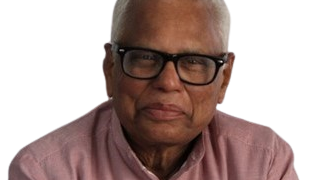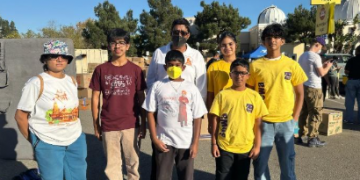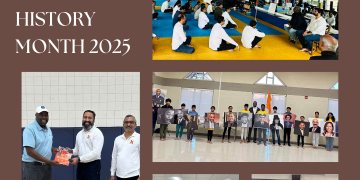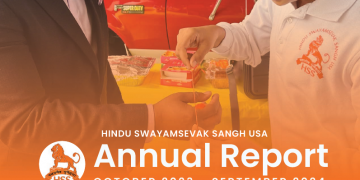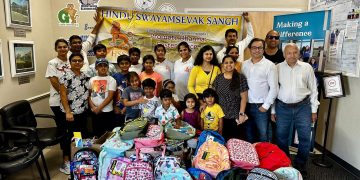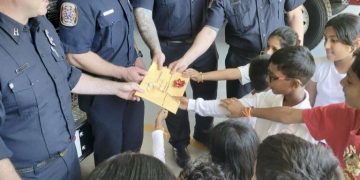During the weekend of February 16-18, Hindu Swayamsevak Sangh MA Chapter held its fifth annual family camp where 70 kids and 40 adults stayed two overnights and enjoyed physical, mental, and spiritual activities. This free family camp was held at the Sadhu Vaswani Center in Dracut, MA.
On Friday around 7:30 p.m., camp attendees began arriving and by 9:00 p.m. about 90 people had arrived. The atmosphere was charged with attention and affection—attention to amenities and affection of friends. All families introduced themselves over tea and snacks. By 10:30 everyone was tired and went to sleep. Although many kids, too eager for the morning to come, stayed awake into the night.
On Saturday morning the whistle blew at the break of dawn and by 6:15 almost everyone was awake. By 7:00 a.m. most other camp attendees had arrived bringing the total to 111. The activities began with parallel sessions of Yoga for adult/teenagers, women, and children. Vijay Chitra and Brij Garg conducted the adults’ yoga sessions.
After yoga, and other physical games, everyone had breakfast. Then it was time for mental activities. Dr. Indraneel Basu gave a talk on the meaning of being a “karyakarta” or a doer. His discussion consisted of four important points. First, “in order to be a karyakarta, there has to be this implicit obedience in the discharge of your actions,” he said. “Every blood cell your body should know that you want to do this action.” Second, he said, “you have to be a maverick in self-sacrifice.” He reminded us that we are mavericks in everything material—we want the best houses, cars, education, etc., but when it comes to self-sacrifice, often we are satisfied with mediocrity. But a real karyakarta is a maverick when it comes to self-sacrifice. Third, “you cannot expect others to do what you cannot do yourself.” He gave an example of when Napoleon, while crossing the Alpines, said “I will not send my men where I cannot go myself.” Napoleon was a ruler, and he could have dispensed with many men for experimental purposes, but he didn’t do that. In order to be a karyakarta, you have to lead by example, not dictation. Fourth, Dr. Basu said, “you have to be truthful.” You can lie to everyone else, but to yourself you cannot lie. If you do, it irrevocably impairs your mind. So, in order to be a karyakarta you have to have purity of mind. Dr. Basu is a faculty in Medicine at Harvard Medical School, Harvard University and is also In-Charge of the Center for Research in Invasive Cardiac Electrophysiology at the Harvard-Thorndike Electrophysiology Institute at Beth Israel Deaconess Medical Center.
Throughout the day there were more physical games, such as kho kho, kabaddi, dodge ball; and also there were more mental activities, such as pranayam, and avartan dhyan or cyclic meditation, led by Balu Shastri. In addition, Harsha Vardhan of Hindu Students Council gave a talk to the kids about Hindu culture. “In addition to the culture, the kids should learn our history and rich heritage.” He also cautioned against chasing after material wealth. There was also a talk by Anil Mahajan on the meaning of Prarthana. He said that prarthana is a one-on-one connection with the divine. He added that prarthana is also reverence for the saffron flag.
On Saturday evening there was an hour of bhajan kirtan, followed by a janam dinam pooja or birthday pooja, conducted by Sanjay and Sangeeta Saxena. All families sat together and performed the rituals.
Saturday night was time for cultural program. For almost two hours, more than 30 kids displayed their talents in reciting shlokas and prayers, dancing to classical as well as modern songs, playing musical instruments such as tabla and saxophone, and telling jokes. There was also a verbal Ramayana quiz during the cultural program for the kids.
After the 10:00 p.m. tea and snacks, everyone went to sleep. It was a long, 14-hour day, but a fruitful one as it was packed with physical, mental, and spiritual activities for men, women, and children.
On Sunday, there was another session of yoga.
At the samarop or concluding ceremony, the chief guest Dr. Anil Saigal gave a talk to the kids. He described to the kids how important of a role parents play in their life and the value of being respectful and caring towards parents. He said, “parents want wings for their children, so that they can fly high.” But then he analogized the situation to a flying kit. He said that only those kites that are controlled by a string fly stable; those whose strings are cut off, fly by the wayside and crash. He likened the parental control to the string and urged the children to let that string guide their lives—only then their lives will be stable otherwise their lives will crash like the kite gone wayside. Dr. Saigal mentioned that there are three important elements to a successful life, first as a child, and then as an adult. First, he said, you need knowledge or gyan. These days a lot of information is available on the internet. Then why go to school? He said that education at a school helps you learn to make good decisions; distinguish right from wrong. Second, he said, you should have devotion or love. He said that devotion helps calm your mind and boost your confidence. Devotion towards parents is the same as devotion to God. Third, he said, you must follow your duty or karma. He said that serving the less fortunate should be everyone’s duty. All the kids really enjoyed this interactive discussion with Dr. Saigal. Dr. Saigal is Professor and Mechanical Engineering Department at Chair at Tufts University, and cofounder of Lokvani.com.
After the discussion, Mrs. Ranjani Saigal distributed certificates to all the kids. Mrs. Saigal is Project Manager for Academic Technology at Tufts University, where she works in the area of Digital Libraries and Educational technologies. She is also the co-founder of Lokvani.com. She is also the founder of Eastern Rhythms School of BharatNatyam Dance.
Finally, Balu Shastri, a vistarak or full time volunteer, gave a talk about the discipline built at shakha. He gave several examples. First, he said that what if you described a person who played games, meditated, and listened to talks for two straight days, without TV or iPods, you might say that he has a boring life. But that is exactly what 111 people did for two and a half days at the family camp and they enjoyed every minute of it. Kids didn’t want to end the fun. Second, he said that even those who desire to obtain a Ph.D degree have to start learning the A-B-C’s first. It’s a process. You learn the letters, then spellings and sentences, then paragraphs, and so on. Success is achieved by a process. Such a process, called discipline is built at the HSS shakhas. Even those who ultimately achieve success need discipline. He gave an example of Shri Ramakrishna Paramhansa. Once someone asked him that even though he had realized God, why did he still do little rituals and poojas everyday. Shri Ramakrishna Paramhansa replied that we are all like brass pots. Just as we must keep brass pots cleaned if we want them to stay shining, we must keep our minds cleaned if we want them to stay shining. Going to shakha is similar to doing the rituals necessary to keep the brass pots shining. It’s the discipline that leads to success.
This family camp was organized by the Satsang Balagokulam and the Aazad Balagokulam of the HSS. Balagokulam is a place where families come every week for 90 minutes of physical and mental exercises.


